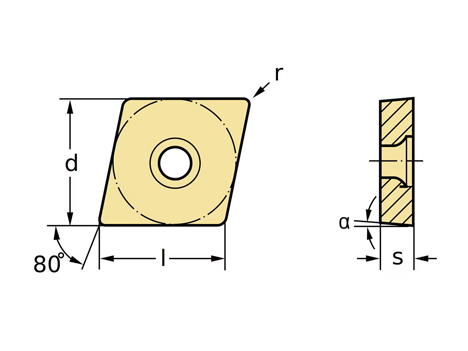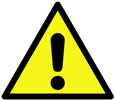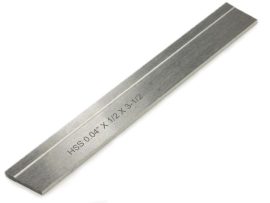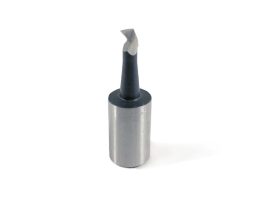80° Carbide Insert
While carbide inserts may have a higher upfront cost, they offer excellent value by providing four usable cutting edges per insert and significantly reducing time spent on tool sharpening.
Carbide cutters excel at machining difficult materials such as cold-rolled steel, stainless steel, and bronze, delivering consistent performance and long tool life. They are also compatible with aluminum, brass, and leaded steels—though for these softer materials, a finely honed high-speed steel tool may still yield the best surface finish.
This is the 10-pack of replacement carbide inserts for the following tool holders:
- 80° Carbide Tool Holders
- 80° RH 3/8″ Boring Bar
- 80° LH 3/8″ Boring Bar
- 80° RH 3/8″ Boring Bar w/2 Flats
- 80° LH 3/8″ Boring Bar w/2 Flats
-
| INSCRIBED CIRCLE | 0.250″ (6.35 MM) |
| CUTTING EDGE LENGTH | 0.254″ (6.45 MM) |
| INSERT THICKNESS | 0.094″ (2.38 MM) |
| CLEARANCE ANGLE MAJOR | 11° |
| INCLUDED ANGLE | 80° |
| ISO INSERT DESIGNATION | CPMT 21.51 |
| CORNER RADIUS | 0.016″ (0.4 MM) |
| MINIMUM FEED PER REVOLUTION | 0.002″ (0.05 MM) |
| MAXIMUM FEED PER REVOLUTION | 0.006″ (0.16 MM) |
| DEPTH OF CUT MINIMUM | 0.004″ (0.1 MM) |
| MAX DEPTH OF CUT | 0.059″ (1.5 MM) |
Related products
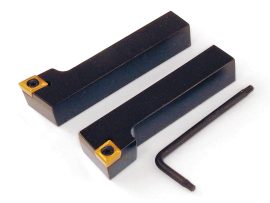

80° RH and LH Tool Holders w/Carbide Inserts
These holders are available individually in right-hand and left-hand configurations, or as a matched pair. Each includes an 80° carbide insert, a hold-down screw, and a Torx® key for installation.
Specifications & Features:
-
3/8" square shank, compatible with standard 3/8" insert tool posts
-
5° offset angle provides better tool clearance for complex operations
-
Tip height is 0.375" from the base, meeting industry standards
-
Constructed from case-hardened steel with a durable black oxide finish
-
80° inserts are ideal for roughing cuts
-
55° insert holders are also available for sharper corner access
For example, when the holder is squared with the crosslide, it allows you to turn an O.D. up to a shoulder, then finish the shoulder by backing the tool out—while maintaining proper clearance throughout the cut.
Advantages of Inserted Tip Carbide Tools
Although more expensive than high-speed steel (HSS), carbide inserts offer key benefits:
-
Each insert can be rotated 180°, giving you two cutting edges per insert
-
Maintain a sharp edge when cutting exotic alloys or abrasive materials
-
Enable faster cutting speeds and improved surface finishes
While HSS tools are ideal for general use due to their affordability and ease of resharpening, carbide tools are essential for challenging jobs, which is why they're widely used in professional machine shops.
Note: Tool orientation is based on the direction of chip flow. A right-hand tool has its cutting edge on the left, with chips exiting to the right.
Chip Breaker Update: The previously used straight-groove chip breaker is no longer available. Current inserts now come with the improved spider web-style chip breaker, as shown in the updated product images.
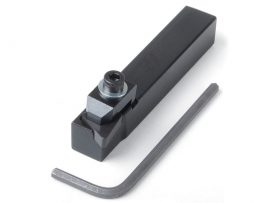

Ceramic Insert Tool Holder
Designed for cutting hard materials like tool steel, this ceramic insert tool holder features a triangular insert mounted at a negative rake angle. The downward tilt of the insert provides proper side clearance, allowing you to use all six cutting edges—three per side—before needing a replacement. The 3/8" shank fits Sherline’s P/N 7600 tool post (not included). A clamp, hold-down screw, and 3/32" hex key are included for secure installation. Replacement inserts are available as (P/N 22659).
Why Use Ceramic Inserts?
Ceramic cutting tools are a powerful addition to the modern machinist’s toolbox. Though more brittle than high-speed steel (HSS) or carbide, ceramic inserts excel at cutting hardened steels and other tough materials, especially at higher spindle speeds. This makes them ideal for jobs that would otherwise be extremely difficult or impossible—such as turning down the shank of an end mill.
This insert’s large nose radius helps achieve an excellent surface finish, particularly when profiling.
-
Each insert offers six usable cutting edges:
-
Rotate 120° to access a new edge (3 per side), then
-
Flip the insert for 3 more cutting points on the opposite face
-
-
In comparison, traditional carbide inserts offer only 2–4 cutting edges, making ceramic inserts cost-effective over time, despite the higher upfront cost.
Usage Notes & Safety Information
-
Ceramic inserts are brittle and should be used with proper technique to avoid chipping or breakage.
-
Caution: Chips produced during cutting can be extremely hot—even red-hot. Use protective eyewear, gloves, and fire-safe clothing when operating.
-
Some materials, such as tool steel, may form long, stringy chips that wrap around the part ("bird’s nest" effect).
Use a chip brush and stop the machine frequently to clear chips. These chip clusters can ignite if they come in contact with hot chips.

